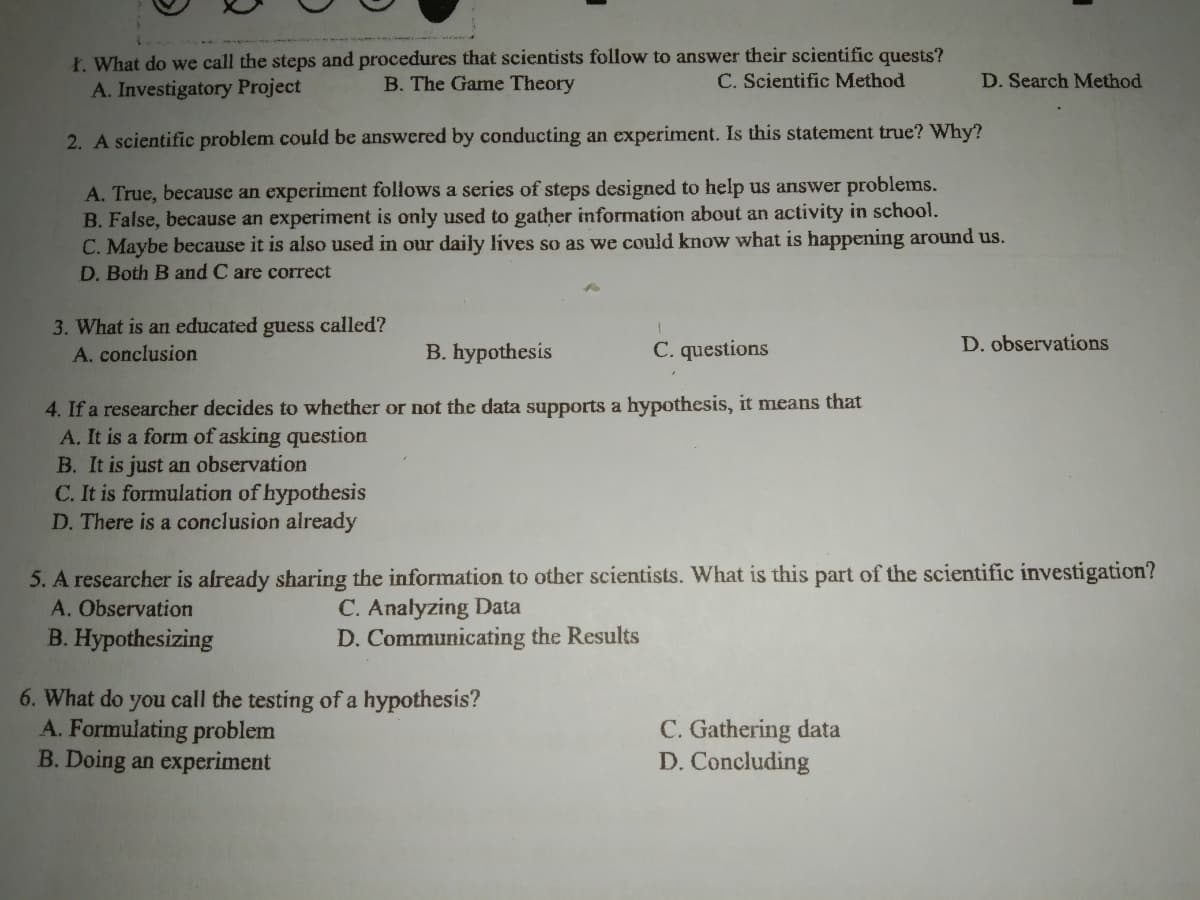1. What do we call the steps and procedures that scientists follow to answer their scientific quests? B. The Game Theory C. Scientific Method D. Search Method A. Investigatory Project 2. A scientific problem could be answered by conducting an experiment. Is this statement true? Why? A. True, because an experiment follows a series of steps designed to help us answer problems. B. False, because an experiment is only used C. Maybe because it is also used in our daily lives so as we could know what is happening around us. D. Both B and C are correct gather information about an activity in school. 3. What is an educated guess called? A. conclusion B. hypothesis C. questions D. observations
1. What do we call the steps and procedures that scientists follow to answer their scientific quests? B. The Game Theory C. Scientific Method D. Search Method A. Investigatory Project 2. A scientific problem could be answered by conducting an experiment. Is this statement true? Why? A. True, because an experiment follows a series of steps designed to help us answer problems. B. False, because an experiment is only used C. Maybe because it is also used in our daily lives so as we could know what is happening around us. D. Both B and C are correct gather information about an activity in school. 3. What is an educated guess called? A. conclusion B. hypothesis C. questions D. observations
Biology 2e
2nd Edition
ISBN:9781947172517
Author:Matthew Douglas, Jung Choi, Mary Ann Clark
Publisher:Matthew Douglas, Jung Choi, Mary Ann Clark
Chapter1: The Study Of Life
Section: Chapter Questions
Problem 1VCQ: Figure 1.6 In the example below, the scientific method is used to solve an everyday problem. Order...
Related questions
Concept explainers
Question
science, help me thankyou

Transcribed Image Text:Ł. What do we call the steps and procedures that scientists follow to answer their scientific quests?
B. The Game Theory
C. Scientific Method
D. Search Method
A. Investigatory Project
2. A scientific problem could be answered by conducting an experiment. Is this statement true? Why?
A. True, because an experiment follows a series of steps designed to help us answer problems.
B. False, because an experiment is only used to gather information about an activity in school.
C. Maybe because it is also used in our daily lives so as we could know what is happening around us.
D. Both B and C are correct
3. What is an educated guess called?
A. conclusion
B. hypothesis
C. questions
D. observations
4. If a researcher decides to whether or not the data supports a hypothesis, it means that
A. It is a form of asking question
B. It is just an observation
C. It is formulation of hypothesis
D. There is a conclusion already
5. A researcher is already sharing the information to other scientists. What is this part of the scientific investigation?
A. Observation
B. Hypothesizing
C. Analyzing Data
D. Communicating the Results
6. What do you call the testing of a hypothesis?
A. Formulating problem
B. Doing an experiment
C. Gathering data
D. Concluding
Expert Solution
This question has been solved!
Explore an expertly crafted, step-by-step solution for a thorough understanding of key concepts.
This is a popular solution!
Trending now
This is a popular solution!
Step by step
Solved in 2 steps

Knowledge Booster
Learn more about
Need a deep-dive on the concept behind this application? Look no further. Learn more about this topic, biology and related others by exploring similar questions and additional content below.Recommended textbooks for you

Biology 2e
Biology
ISBN:
9781947172517
Author:
Matthew Douglas, Jung Choi, Mary Ann Clark
Publisher:
OpenStax

Biology: The Dynamic Science (MindTap Course List)
Biology
ISBN:
9781305389892
Author:
Peter J. Russell, Paul E. Hertz, Beverly McMillan
Publisher:
Cengage Learning


Biology 2e
Biology
ISBN:
9781947172517
Author:
Matthew Douglas, Jung Choi, Mary Ann Clark
Publisher:
OpenStax

Biology: The Dynamic Science (MindTap Course List)
Biology
ISBN:
9781305389892
Author:
Peter J. Russell, Paul E. Hertz, Beverly McMillan
Publisher:
Cengage Learning


Human Biology (MindTap Course List)
Biology
ISBN:
9781305112100
Author:
Cecie Starr, Beverly McMillan
Publisher:
Cengage Learning